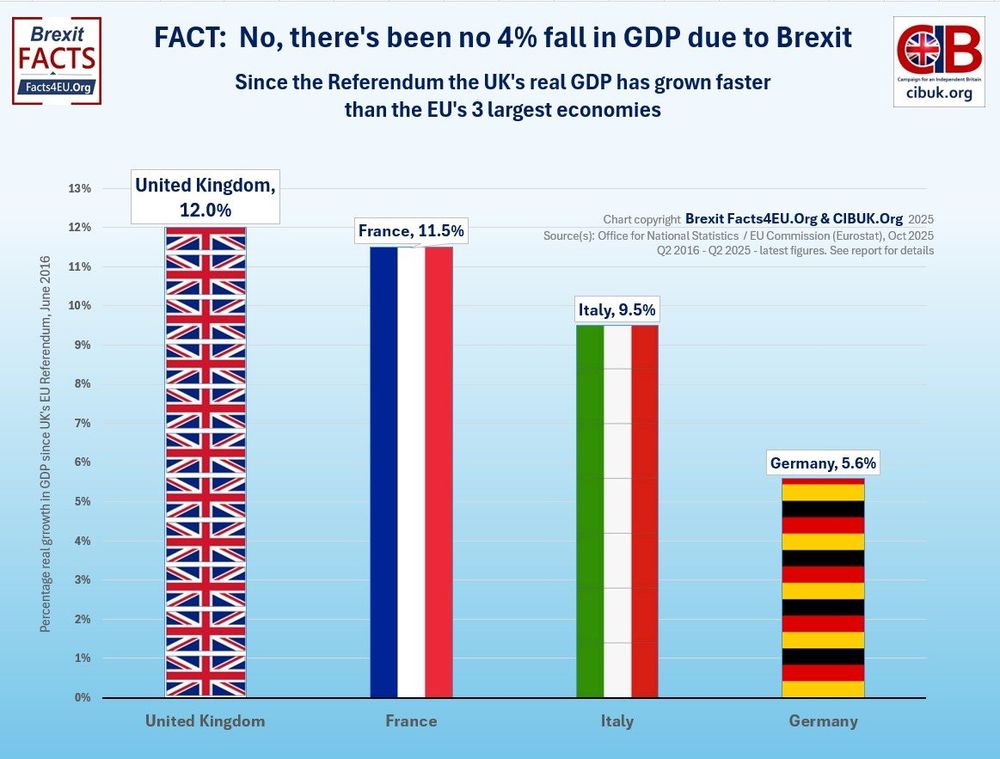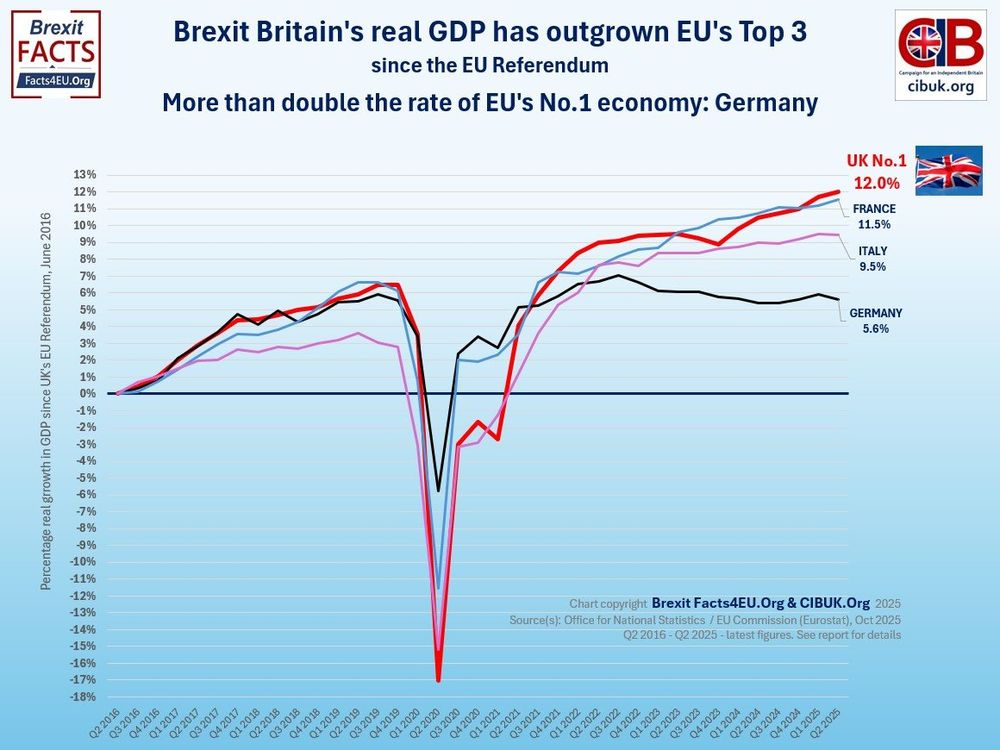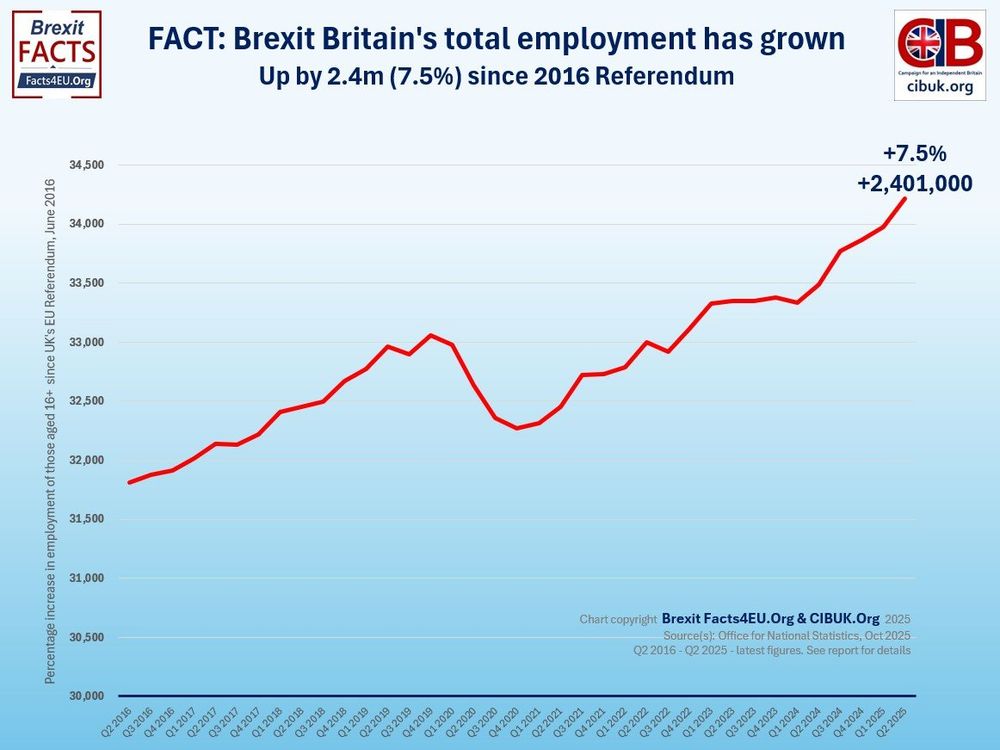With the Autumn Budget just around the corner, a bombshell new report debunks Rachel Reeves’s claim that Brexit is to blame for Britain’s bleak economic outlook.
Ms Reeves went to the International Monetary Fund’s annual meeting in Washington earlier this month and told them Brexit “will reduce the UK’s long-term productivity by four per cent relative to remaining in the bloc”.
In an exclusive pre-Budget report for GB News, think tanks Brexit Facts4EU and The Campaign for an Independent Britain (CIBUK), together with the Rt Hon Sir John Redwood, bring readers the latest economic data proving that Brexit is not to blame for the Chancellor’s budget woes.
The stunning new figures show Britain soaring after leaving the EU, and that the economic dark clouds gathering are very much of the scrambling Chancellor’s own making.

Britain’s real GDP growth beat out the EU’s finest post-Brexit
|
FACTS4EU / CIBUK
The Chancellor’s debunked claims at a glance
Since leaving the EU, Britain has outpaced the continent in terms of real GBP growth by a huge 12 per cent.
This was compared to the nearest competitors, France, with 11.5 per cent, Italy, with 9.5 per cent, and Europe’s often celebrated economic powerhouse, Germany, with 5.6 per cent.
The facts do not bear out the chancellor’s claim that Britain’s GDP has contracted by four per cent.
Reform’s leader Richard Tice called the findings “damming” for Ms Reeves, who “pinned all her hopes on trying to fool the British public that Brexit is somehow to blame for the economic crisis she has plunged us into”.
He added: “We’ve beaten Germany – in fact, our economic growth has been more than double theirs. We’ve beaten France and we’ve beaten Italy. We wish them well, but this is something to be celebrated, and it shows what a great, resilient country we are.”

The UK’s economic growth after leaving the EU was more than DOUBLE that of Germany’s
|
FACTS4EU / CIBUK
The bogus projections laid bare
The Chancellor and the OBR’s claims about a four per cent retraction in GDP are based on reports from George Osborne and the Treasury from before the Referendum.
The bogus reports averaged 13 forecasts from a plethora of sources, each one of them anti-Brexit. These projections also claimed Brexit would bite immediately after voting to leave.
In another galling turn, the forecasts attempted to forecast Britain’s economic woes over a 15-year period – a time period far pushing the meagre prediction powers of the Treasury and OBR.
This is where Ms Reeves’s brazen four per cent figure originates.
Sir John Redwood called the claim a “breathtaking lie” as he blamed “a bad, average forecast of four per cent less productivity growth over 15 years or an annual rate of 0.25 per cent less”.

British employment numbers blossomed in a post-Brexit boom
|
FACTS4EU / CIBUK
Briain’s post-Brexit Boom in emplyoment
Contrary to the doomsaying of the then 2016 Government, the number of employed Britons has risen by an impressive 2.4million since Brexit.
At the time, it was predicted that leaving the EU would lead to as many as 500,000-820,000 being made redundant.
Like the GDP figures, the opposite occurred as employment figures have continued to grow by 7.5 per cent since the Brexit vote.
Brexit Facts4EU point out it is the policies of the present Chancellor that now appear to be chipping away at this post-Brexit boom.
Mr Tice agreed, declaring that the time was now for Britain to get the “inspirational leadership with economic policies that make sense to the vast majority”.
“The world is constantly changing and we need to be adaptable and to make the most of the advantages we possess. This starts at home, where people must feel rewarded for their efforts, not penalised with ever-increasing taxes,” he added.



